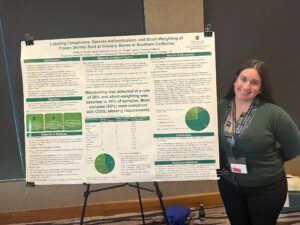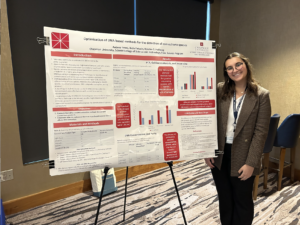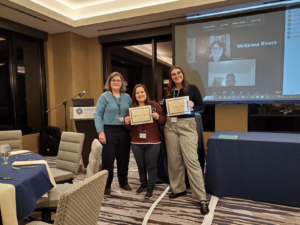The 73rd Pacific Fisheries Technologists conference brought over 80 national and international attendees – all serving in supportive seafood and fisheries roles. This year’s forward-thinking program touched on topics such as alternative seafoods, wind energy off the Pacific coast, novel technologies in seafood research, seafood safety, and microplastics and sustainable packaging, which prompted deep discussions over the course of the three-day event.
The conference included a monetary prize provided by the Seafood Industry Research Fund.
“We are happy that SIRF recognizes the longevity of PFT and their collaboration between industry and research”, says Lisa Weddig, NFI VP of Regulatory and Technical Affairs. “We are pleased to support new generations of scientists in the seafood industry.”
“PFT is more than just a forum for those in academia, industry, and regulatory agencies”, says Virginia Ng, 73rd PFT President. “PFT also values the strengthening of students’ interpersonal, professional, and science communication skills and promotes this through its oral and poster competitions with monetary prizes that are graciously provided by SIRF. PFT is forever thankful for the support it had for its 73rd conference and we look forward to serving the seafood and fisheries world in many more years to come.”
The winners of the oral competition this year are Leyi Zhou (1st), Natalie Mastick (2nd), and Bryan Gaspich (3rd). The poster presentation winners are Dayne Darlen Lezame-Balderrama (1st), McKenna Rivers (2nd), and Aubrey Emmi (3rd).
“Labeling Compliance, Species, Authentication, and Short Weighting of Frozen Shrimp Sold in Grocery Stores in Southern California.
Second place poster presentation winner McKenna Rivers titled her project “Labeling Compliance, Species, Authentication, and Short Weighting of Frozen Shrimp Sold in Grocery Stores in Southern California.”
Her objective was to examine species labeling, glazing, net weight, and compliance with country-of-origin labeling (COOL) regulations for frozen, uncooked shrimp sold in Southern California. By collecting 106 shrimp products from 37 grocery stores licensed under PACA, Rivers concluded that mislabeling was detected at a rate of 26% and short-weighting was detected in 36% of samples, though most samples had high rates of compliance with COOL labeling requirements.

McKenna Rivers, 2nd place winner, Chapman University
“Optimization of DNA-based Methods for the Detection of Canned Tuna Species”
Third-place winner Aubrey Emmi titled her project, “Optimization of DNA-based Methods for the Detection of Canned Tuna Species.” Her objective was to compare four different DNA extraction methods for use with canned tuna products and determine how the substance the tuna is packaged in (oil or water) affects DNA extraction. Using DNA extraction methods and PCR and DNA sequencing, Emmi concluded that the DNeasy and Mericon methods had the greatest sequencing success and that tuna packed in oil showed greater amplification success overall than tuna packed in water.

Aubrey Emmi, 3rd place winner, Chapman University

Lisa Weddig, VP of Regulatory and Technical Affairs at NFI (left), Dayne Darlen Lezame-Balderrama, 1st place poster presentation winner (middle), and Aubrey Emmi, 3rd place poster presentation winner (right)
For more information on the event, visit http://pftfish.net/2023/programBook.pdf
